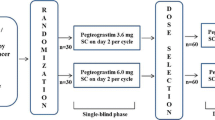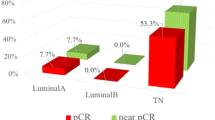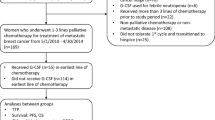Abstract
An apparent chemotherapeutic dose-response relationship for patients with breast cancer has provided clinicians with the impetus to investigate further the usefulness of dose-intensification strategies in this setting. These approaches have provided promising results: noticeable improvements in response rates in terms of disease-free survival have been recorded, particularly when dose intensification has been used as first-line consolidation therapy for chemosensitive advanced disease and as consolidation in adjuvant therapy for high-risk patients. It may also be of use in the treatment of inflammatory and locally advanced disease. Although the results of prospective studies will help to define the potential advantages of dose-intensification strategies further, comparisons of myeloablative and subablative intensification regimens are needed to define the role of dose and dose intensity in this setting.
Similar content being viewed by others
Author information
Authors and Affiliations
Rights and permissions
About this article
Cite this article
Antoine, E., Khayat, D. European School of Oncology European consensus on the use of granulocyte colony-stimulating factor: the example of breast cancer. Cancer Chemother Pharmacol 38 (Suppl 1), S103–S109 (1996). https://doi.org/10.1007/s002800051049
Issue Date:
DOI: https://doi.org/10.1007/s002800051049




